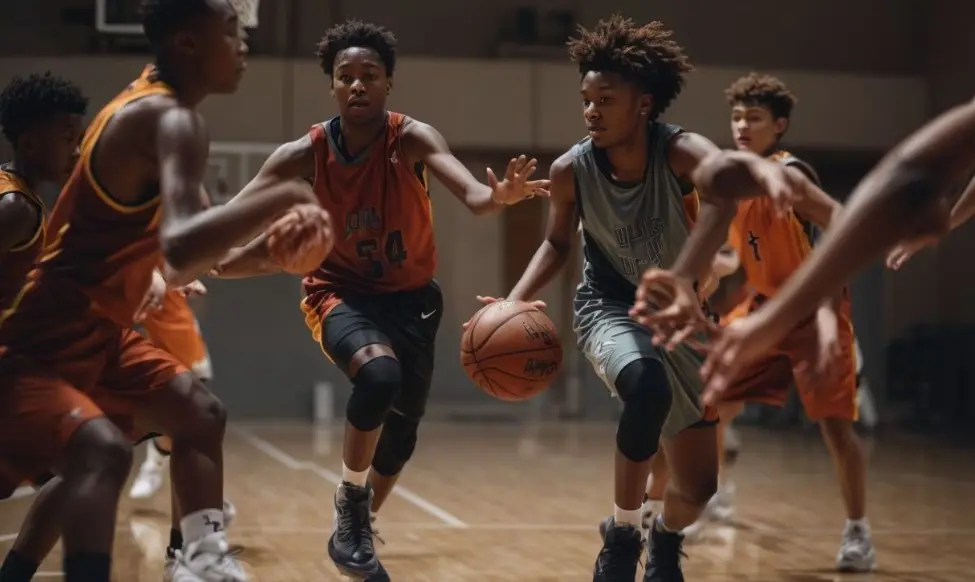Building the Basics: Foundation First
Basketball, one of the most exhilarating team sports, captures the attention and aspirations of countless young athletes. The journey to basketball proficiency begins with mastering the basics. These foundational skills — dribbling, shooting, and passing — form the bedrock upon which advanced techniques are built. It’s a coach’s responsibility to ensure these basics are not only taught but ingrained into the daily practice of the athletes. One effective way to achieve this is by using structured curriculum guides that provide comprehensive frameworks for skill development. Furthermore, preseason basketball clinics can offer young players a unique opportunity to receive mentorship from experienced coaches, further reinforcing and extending the skills learned.
Consistent practice with proper guidance helps players develop muscle memory, improving game performance. Exposure to competitive play also allows young athletes to test their skills under pressure and build resilience. A solid foundation in basketball fundamentals can inspire long-term growth and success on and off the court.
Innovative Drills for Skill Improvement
While foundational skills are essential, sustaining engagement requires innovation. Traditional drills, although practical, might not always captivate young learners who thrive on variety and challenge. Innovative drills can breathe fresh life into training sessions. For instance, coaches can design drills incorporating elements of competition and fun, such as timed challenges or mimicry of favorite NBA play sequences. Moreover, research suggests that players who practice in situations that closely simulate game conditions can transfer these skills more effectively. Even NBA stars have improved their game through non-traditional training methods that challenge the norm and encourage creativity and strategic thinking.
The Role of Technology in Modern Training
Today’s youth are digital natives, and integrating technology into basketball training can resonate with them. Technology such as wearable fitness trackers, video analysis software, and interactive training apps can provide players with immediate feedback, revolutionizing how athletes understand their performance. These tools enable precise tracking of variables like shooting accuracy, dribbling speed, and endurance levels, offering players and coaches a data-driven approach to improvement. With these insights, personalized training regimens become feasible, addressing specific areas that need development. This tech integration enhances physical skills and bolsters young athletes’ cognitive engagement with the sport.
Teamwork and Communication: Key Components
At its core, basketball is a team sport, and the ability to work collaboratively is a cornerstone of success. Effective communication and teamwork transform individual players into a cohesive unit. Coaches can foster these skills through specific exercises that require collaboration and communication under pressure. Activities such as cooperative drills, where success depends on passing or executing strategies as a team, teach players the importance of mutual reliance and trust. These skills are crucial for sporting success and valuable life skills that benefit players off the court personally and professionally.
Embracing Sports Psychology
The mental facet of training is integral to a young athlete’s development. Sports psychology addresses athletes’ mental challenges, from performance anxiety to maintaining focus amid distractions. By incorporating sports psychology principles, coaches can help athletes build mental resilience, develop focus, and gain the ability to maintain positivity, even in challenging situations. Practices such as visualization techniques, mindfulness training, and goal-setting can empower athletes, equipping them to approach competition with a calm and focused mindset, turning potentially stressful scenarios into opportunities for personal growth.
Ensuring Safety and Injury Prevention
Sports injuries can be a significant setback for young athletes; thus, prioritizing safety and prevention is vital. Coaches and trainers must advocate for proper warming-up routines, using protective gear, and ensuring that young players are taught correct techniques. This foundational knowledge reduces the likelihood of injury and sets athletes up for a sustainable sporting career. Educating players and parents about common injuries and their prevention empowers everyone involved to take proactive steps toward maintaining athletes’ health, ensuring they enjoy the game safely throughout their youth and adulthood.
Encouraging Lifelong Passion for the Sport
Instilling a lifelong passion for basketball transcends mere technique and strategy. It involves creating a supportive environment where young athletes can thrive and develop a love for the sport. By focusing on the game’s competitive and enjoyable facets, coaches can nurture an environment where young players feel valued and excited about basketball. This passion encourages continued participation in sports and engenders an appreciation for teamwork, perseverance, and commitment. Through such nurturing environments, basketball becomes more than a game; it becomes an enduring passion.
